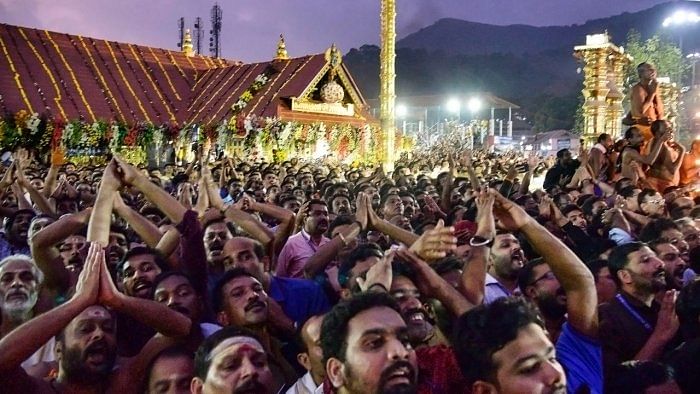
The Supreme Court on Thursday said that there was no rationale in prohibiting entry of women to Kerala's Sabarimala temple as some of them below 10 years and beyond 50 years of age could still menstruate.
The top court also found as impossible the condition of observing abstinence for 41 days before undertaking a pilgrimage to Lord Ayappa's temple, saying this has led to the ban on the entry of women in the age group of 10 to 50 years.
Hearing a reference arising out of a challenge to the practice, a five-judge Constitution bench presided over by Chief Justice Dipak Misra said that it is the devotion that makes a woman visit a temple. “There is no rationale with the object sought to be achieved by this notification,” the bench said.
Also Read | Sabarimala temple authorities warn legal action against misleading campaign over woman entry
Senior advocate A M Singhvi, appearing for Travancore Devaswom Board, running the over 800-year-old temple, said that it is the only shrine in the world that observes the belief that women in the menstruating age should not be allowed inside it. The temple is supposed to depict “Nashtika Brahmacharya”, he said, adding exclusion during menstruation is common practice.
People from all castes and religions can visit the temple and only women in that particular age group are not allowed into it because of the simple reason that it is impossible for them to observe abstinence for 41 days before the pilgrimage, he said.
"This is the imposition of an impossible condition that one has to observe a 41-day abstinence period. What you cannot do in law is being done by imposing this condition," the bench, also comprising Justices R F Nariman, A M Khanwilkar, D Y Chandrachud and Indu Malhotra, said.
“You have to justify the prohibition...A woman cannot sustain abstinence, so you have imposed the condition,” the bench said.
Senior advocate Raju Ramachandran, acting as an amicus curiae, said that the exclusion of women in that particular age group was akin to untouchability which was prohibited under Article 17 of the Constitution.
Watch the latest DH Videos here:
